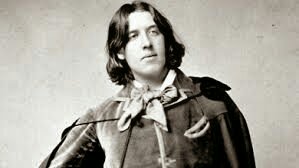Canzonet by Oscar Wilde: The Poem “Canzonet” is written by Oscar Wilde and it is a kind of love poem. Canzonet is a song addressed to the poet’s perhaps, or intended, symbolically, to England.
The Text of the Poem Canzonet
Of gryphon-guarded gold;
Now, as before,
Bare is the shepherd’s fold.
Rubies nor pearls
Have I to gem thy throat;
Yet woodland girls
Have loved the shepherd’s note. Then pluck a reed
And bid me sing to thee,
For I would feed
Thine ears with melody,
Who art more fair
Than fairest fleur-de-lys,
More sweet and rare
Than sweetest ambergris.What dost thou fear?
Young Hyacinth is slain,
Pan is not here,
And will not come again.
No horned Faun
Treads down the yellow leas,
No God at dawn
Steals through the olive trees.Hylas is dead,
Nor will he e’er divine
Those little red
Rose-petalled lips of thine.
On the high hill
No ivory dryads play,
Silver and still
Sinks the sad autumn day.
The Poet
Oscar Wilde was one of the greatest writers of his time. Read more about Oscar Wilde’s popular work.. Read more about Oscar Wilde’s popular work.. Given the large variety of works that he had penned, Wilde is still one of the most popular authors.
Canzonet Poem Review
Wilde writes a humble poem here. He portrays himself as a shepherd, a poor one, who hasn’t bagged full of gold or jewels. As ever, his hands are empty. However, the woodland girls have often loved the shepherd’s voice. He would sing for them and fill their ears with soulful melodies.
Wilde asks his beloved what she fears and why does she have to. Young Hyacinth had been slain and Pan was not there and won’t ever go there again. There is no young Faun with horns who tread through the woods. There isn’t even God who peeks through olive trees at dawn.
Wilde creates a beautiful narrative in this one. He speaks of how a shepherd’s music is more precious than the riches of the world. He talks about fear and names some old biblical characters.
However, the most relevant is the last stanza. It only implies that a bad, dull day, too, ends. The one who had to be slain has been slain. The ones who remain must move ahead.
More Info On- Despair by Samuel Coleridge, The Good, Great Man, Faded Flower, Presence Of Love
